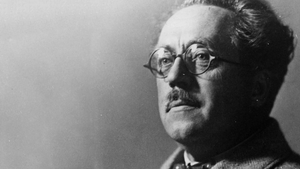 Reviewed by Ewart Shaw, Sunday 17th January 2021.
Reviewed by Ewart Shaw, Sunday 17th January 2021.
The Adelaide Summer Orchestra comes together each January, rather like a summer school event, plays one concert, and then dissolves into its component parts, the musicians returning to the Elder Conservatorium, and the various city orchestras that do so much to keep music alive in Adelaide. There are music teachers, retired professionals, and those musicians who reinforce the fact that the word amateur is rooted in the Latin 'to love'.
This year, conducted by the magisterial and amiable Nicholas Braithwaite, and led by Shelley Walker, the orchestra played two works, reputedly getting their Australian premieres, one from 1967 and the other from 1929/30.
Let me start with the second piece on the programme, October, by Dmitri Shostakovitch (1906-1975). The work is among many that were commissioned to mark the 50th anniversary of the 1917 Russian revolution.
Since I heard this piece first on Sunday I've listened to it every day in various performances, thanks to YouTube. It is a thrilling concentration of heroic Russian style. From the stormy opening swirl of the strings, this is martial music, a suitable hymn to Russian military might, with plangent woodwind adding that touch of melancholy, a remembrance of the dead. Shostakovitch, however, carefully codes references to some of his other works, including a piece on the death of Stalin. There is much that must not be forgotten in this triumph. The cloth-eared commissars who supervised Russian music missed it completely.
The layout of the concert had the major part of the orchestra seated on the floor of the Hall, with the percussion section on the stage. It was a great pleasure to watch Jake Fedczyszyn take charge of the timpani. Snare drum and cymbals were in the hands of Henry Millar and Cameron Walker. Imagine, you get to play the cymbals. You sit motionless for most of the work, counting internally, then rise to your feet to add the few clashes that really signal the end of the work.
The major work on the program was the 'cello concerto of Frank Bridge (1879-1941). Bridge, if he is known today, is remembered as the teacher of
Benjamin Britten. One of Britten's first works was a set of variations on a theme of Frank Bridge. He was a pacifist and it is easy to see this work, to hear this work, as a delayed response to the loss and devastation of the First World War. Unlike the noble heroism of the Elgar, this is much more personal. Though it is titled Oration, it's more like a sentimental reflection on loss, at times just this side of maudlin.
The solo line is rarely still, marked by rapid passages that traverse the whole range of the instrument; the score marks the 'cello line along three separate clefs. The effect is of nervous chattering, that throbs with emotional energy. About halfway through, the 'cello encounters an outburst of military energy from the orchestra, a lone trumpet sounds an incomplete fanfare, and this leads to a questioning cadenza. The militancy dies, the army retreats, and the solo voice, for the 'cello is so like the human voice, becomes, if not less despondent, a little more accepting. The last few bars, marked epilogue in this one-movement work, bring in starlight harp, and the 'cello sinks to its lowest register, and sleeps.
Simon Cobcroft is both impressive and impassive as the soloist, his face rarely displaying any emotion, as he pours is heart into the music, drawing some effectively plaintive sounds from his instrument. He catches the confusion of the composer's complex feelings. He'd probably like another chance to play this work, as he's likely the only 'cellist in Australia to have opened the score.
We wore our masks and we applauded mightily, grateful for the chance to sit in a more than decent acoustic, in the company of old friends, and begin our orchestral year is so satisfying a way.
Reader Reviews
To post a comment, you must
register and
login.
 Reviewed by Ewart Shaw, Sunday 17th January 2021.
Reviewed by Ewart Shaw, Sunday 17th January 2021. Reviewed by Ewart Shaw, Sunday 17th January 2021.
Reviewed by Ewart Shaw, Sunday 17th January 2021.